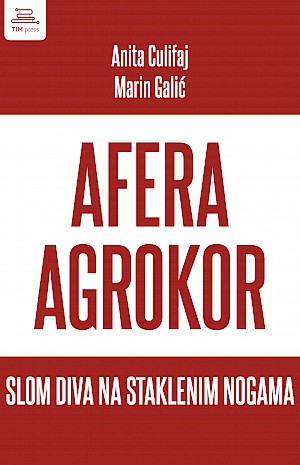
The Agrokor Affair
- The Collapse of the Glass-legged Giant
- Anita Culifaj, Marin Galić
In the book The Agrokor Affair. The Collapse of a Glass-legged Giant, authors Anita Culifaj and Marin Galić analyze the communication of the Government of the Republic of Croatia during the crisis related to the Agrokor affairand, using the case study method, present findings on how members of the Government of the Republic of Croatia communicated about the restructuring process of the concern, from the moment they assumed responsibility for crisis management and passed a special law, lex Agrokor, in April 2017, until the final settlement in July 2018. In parallel with resolving the crisis related to the Agrokor concern, the Government had to deal with scandals involving leading people from its ranks, who were responsible for resolving the crisis, throughout the restructuring period. Therefore, the Government's crisis communication focused on the difficulties of restructuring the company, but also on public appearances regarding scandals and conflicts of interest.
This case study seeks to gain deeper insights into the content and manner of conducting the Government's crisis communication, which was greatly influenced by certain features of the political, economic and social context, and the aim of the book is to determine whether the Government's communication on this affair was successful, despite a number of difficulties and controversies. Given that there are not many works in the Croatian scientific community that examine and analyze crisis communication methods in the political arena, this book is a valuable contribution to communication science.
* * *
Over time, the conglomerate became too big to fail, which is why the „Agrokor problem“ took on a political dimension. The company consolidated its market position through constant growth. In addition to expanding its operations for years across numerous companies in Croatia and the region—thanks to clientelistic ties—it grew into the most important private company in the country, employing approximately 40,000 workers in Croatia alone. The government continuously emphasized that Agrokor was the backbone of the Croatian economy—meaning, a company whose collapse could bring down the entire economic system. The large number of employees gave Agrokor a privileged position in Croatian society, especially in political circles, with whose support the company secured favorable loans, state subsidies, and other benefits.
* * *
Had the Government of the Republic of Croatia communicated more effectively with the media and the public regarding the Agrokor affair, the public would not have questioned whether the communication strategy managed to justify such a pronounced state intervention in the realm of private enterprise—something extremely rare in capitalist countries. Furthermore, there likely would not have been any subsequent analyses of the communication aspects of the entire case. Over time, the public would have forgotten the largest scandal in Croatia’s history—one involving the financial troubles of the country's then-leading company and the role of the state, which, in the name of economic stability, chose to intervene in resolving them.
Anita Culifaj, Marin Galić
- ISBN: 978-953-369-060-5
- Dimensions: 170x240 mm
- Number of pages: 280
- Cover: paperback
- Year of the edition: 2025